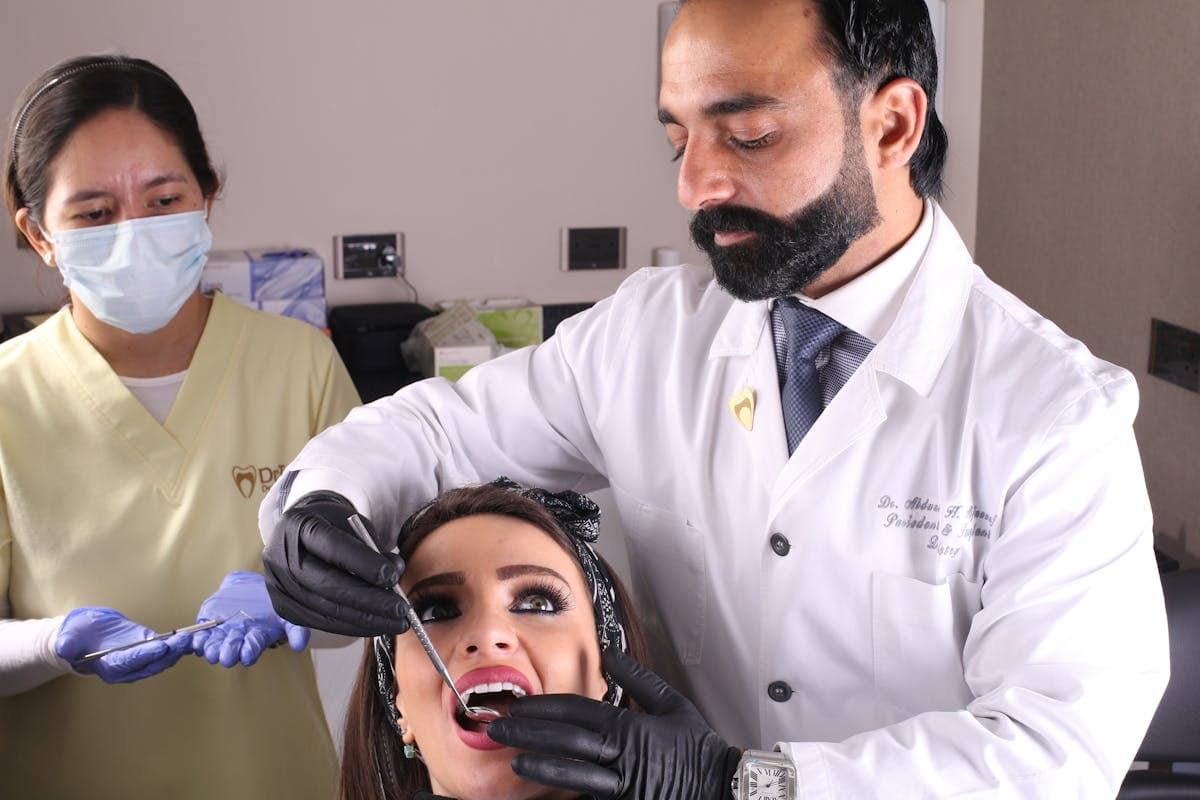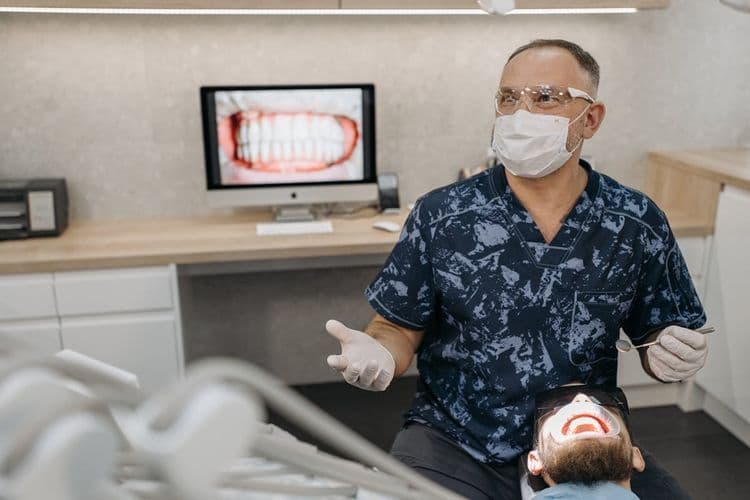Dental implants, although heralded as a reliable solution for tooth replacement, are not devoid of potential complications. Both the surgical protocol and subsequent care can considerably impact the success or failure of the procedure. Implant rejection, infections, nerve damage, and sinus complications are just a few issues that can emerge. In addition, individual health factors such as uncontrolled diabetes, smoking, and poor oral hygiene can exacerbate the risk. This prompts the inquiry: How can patients and healthcare providers collaboratively manage and mitigate these risks to maximize the success of dental implants?
Understanding Dental Implants
Although dental implants are a common solution for tooth loss, understanding the procedure and potential complications is essential for any patient considering this dental option. Dental implants are typically made of two primary types: endosteal and subperiosteal. Endosteal implants, the most common type, are placed directly into the jawbone, while subperiosteal implants rest atop the jawbone under the gum tissue. The types of implant materials used often include titanium and zirconia due to their biocompatible properties, meaning they do not cause adverse reactions when placed within the body. These materials also offer strength and durability, mimicking the natural tooth structure. Despite the high success rates, it’s crucial to understand the procedure’s intricacies before proceeding with dental implants.
Common Complications With Implants
As we progress further into the topic of dental implant issues, it is essential to address the common complications associated with these procedures. Primary among these are implant failure causes and post-implantation infections, which pose significant challenges in dental medicine. This discussion will focus on the aforementioned complications, their causes, and potential mitigations in a clinical setting.
Implant Failure Causes
While dental implants have a high success rate, they are not without potential complications. The causes of implant failure can be multifaceted, often involving complex interactions between surgical technique and patient health. Precise surgical technique is critical for successful implant placement. Misalignment during surgery can lead to excessive pressure on the implant, resulting in failure. Additionally, patient health plays an important role. Underlying conditions such as diabetes or osteoporosis can compromise bone health, impeding the implant’s ability to fuse correctly with the jawbone. Moreover, habits such as smoking or poor oral hygiene can negatively impact the healing process post-implantation. Understanding these factors is essential for both prevention and treatment of implant failure.
Infection Post-Implantation
In the domain of dental implantology, post-implantation infection emerges as a common complication. This often results from bacterial contamination during the surgical procedure or insufficient post operative care.
The infection is typically characterized by persistent pain, swelling, and discomfort around the implant site. It can also lead to loosening of the implant, impairing its integration with the bone. If not promptly addressed, this condition could escalate to peri-implantitis, a destructive inflammatory process affecting the soft and hard tissues surrounding the implant.
The key to mitigating such complications lies in stringent sterile protocols to limit bacterial contamination, alongside thorough post operative care. This includes patient education on oral hygiene practices, regular follow-ups, and timely intervention when signs of infection occur.
Infection After Implant Surgery
Despite the high success rates of dental implant surgeries, there are instances where complications may arise. One such complication is infection after implant surgery. This can occur due to various factors, the most common being bacterial contamination during the surgery or in the post-operative care period. Bacterial contamination can occur from unsterilized surgical instruments, or from the patient’s mouth itself. The symptoms often include pain, swelling, and pus formation. Post-operative care plays a pivotal role in preventing such infections. This typically involves maintaining oral hygiene, taking prescribed antibiotics, and regular follow-ups with the dentist. Any signs of infection should be promptly reported to the dentist to prevent further complications.
Nerve Damage From Dental Implants
Nerve damage from dental implants, though relatively rare, presents a significant risk in dental implantology. Comprehending the causes, recognizing symptoms and utilizing accurate diagnostic tools are integral to mitigating its occurrence. An exploration of effective treatments and preventative measures is also essential in proficient dental implant care.
Causes of Nerve Damage
Dental implant procedures, while commonly successful, have the potential to cause nerve damage in some cases. The implant’s placement, surgical techniques used, and the individual’s nerve regeneration capacity can influence the risk of damage.
- Implant Placement: The location of the implant can directly impact the nerves. If placed too close to or in the nerve, the implant can cause damage.
- Surgical Techniques: Inadequate surgical techniques can lead to nerve damage. This includes excessive drilling, forceful implant insertion, or lack of attention to anatomical structures.
- Nerve Regeneration Capacity: Individual differences in nerve regeneration can influence damage risk. Some people may have a slower nerve healing process, making them more susceptible to prolonged or permanent damage.
Avoiding nerve damage requires careful planning, precision in surgical techniques, and consideration of the patient’s unique factors.
Symptoms and Diagnosis
A significant proportion of patients suffering from nerve damage due to dental implants may initially notice unusual sensations in their mouth. Symptom recognition is essential in these instances, with patients reporting a variety of symptoms such as pain, altered sensation, or even numbness. These symptoms, particularly when persistent or severe, should prompt immediate consultation with a dental professional.
Diagnostic procedures for nerve damage from dental implants employ a mix of clinical examination and imaging techniques. Clinically, practitioners may use sensory tests to evaluate altered sensation areas. Imaging modalities, such as cone-beam computed tomography (CBCT), can more accurately discern the extent of the damage. Early diagnosis can mitigate potential complications and improve patient outcomes.

Treatment and Prevention
To ideally manage nerve damage from dental implants, a thorough treatment approach is essential. This incorporates meticulous post operative care, patient education and timely intervention.
- Post Operative Care: This involves regular monitoring of the patient’s condition, managing pain and inflammation, and immediate intervention when symptoms of nerve damage appear.
- Patient Education: Patients should be adequately informed about the possible risks and symptoms of nerve damage. Knowledge can empower them to report any discomfort promptly, leading to early detection and treatment.
- Timely Intervention: If nerve damage is suspected, swift action is required. This may include modification or removal of the implant, or referral to a specialist.
Proper adherence to these steps can mitigate complications, ensuring a smoother recovery.
Sinus Problems Related to Implants
Often, patients undergoing dental implant procedures encounter an unexpected issue: sinus problems related to their new implants. The proximity of the upper jaw to the sinuses can cause complications during or after dental implant surgery. One such complication is sinus perforation, where an implant penetrates the sinus cavity. This can lead to infection, discomfort, and potentially the need for additional surgery.
To mitigate this risk, a procedure known as a sinus lift is often performed prior to implant placement. This involves elevating the sinus membrane and inserting bone graft material, thereby creating a safer distance between the implant site and the sinus cavity. However, even with these precautions, sinus-related complications can still occur, underscoring the need for careful surgical planning and patient education.
Dental Implant Failure and Causes
Despite the high success rates of dental implant procedures, instances of dental implant failure do occur, with varying underlying causes. The longevity of implants can be compromised by factors such as:
- Inappropriate patient selection: Patients with uncontrolled systemic conditions, such as diabetes, or those who smoke heavily may experience higher failure rates.
- Poor oral hygiene: Consistent, proper care of the implant site is critical for maintaining implant health and longevity.
- Technical issues: Improper installation or low-quality implants can lead to failure.
Understanding these causes can help dental professionals refine patient selection and post-operative care strategies. However, even with the best practices, the potential for failure remains. Consequently, continual monitoring and patient education are key to implant success.
Coping With Implant Rejection
The risk of dental implant rejection is another challenging aspect that can arise post-implantation. Rejection symptoms may include severe pain, inflammation, and the implant becoming loose. The body, viewing the implant as a foreign object, initiates an immune response, leading to these symptoms. The emotional toll can be considerable, and emotional support is vital during this time. Patients may feel disappointment, frustration, and anxiety. It’s important for clinicians to provide empathetic and informative communication, helping patients understand the situation and potential next steps. Additionally, referring patients to mental health professionals can be beneficial. Through these measures, clinicians can guarantee that patients are not only physically cared for but emotionally supported as well.
Preventing Dental Implant Problems
A notable number of dental implant problems can be mitigated through careful planning and stringent oral hygiene practices. Appropriate pre-surgery evaluation is essential in identifying potential issues that could compromise the success of the implant.
Incorporating these three implant maintenance tips can help prevent complications:
- Regular dental check-ups: Routine visits to the dentist allow early detection of potential issues, facilitating timely intervention.
- Proper oral hygiene: Regular brushing, flossing, and using mouthwash can prevent bacterial build-up around the implant, reducing the risk of infection.
- Avoiding harmful habits: Reducing tobacco and alcohol consumption can greatly improve the longevity of dental implants.
Frequently Asked Questions
What Are the Costs Associated With Fixing Failed Dental Implants?
The costs to rectify failed dental implants vary widely, influenced by factors such as surgical complications and the patient’s overall oral health. Financial implications may include procedures for removal, bone grafting, and new implant placement.
Can a Failed Dental Implant Be Replaced?
Yes, a failed dental implant can be replaced. Various failed implant options are available and replacement procedures are tailored to individual cases. However, a thorough assessment is essential to determine the best course of action.
How Long Does the Healing Process Take After Dental Implant Surgery?
The healing timeline post dental implant surgery typically spans several weeks to a few months, varying per individual. Adherence to prescribed recovery tips such as proper oral hygiene can expedite and enhance the healing process.
Is There Any Dietary Restriction After Dental Implant Surgery?
Post surgery nutrition is vital following dental implant surgery. Patients are advised to consume soft, healing foods to aid recovery, while avoiding hard, crunchy, or excessively hot or cold foods to prevent implant damage or discomfort.
What Are the Alternatives to Dental Implants if They Are Not Suitable for Me?
If dental implants are unsuitable, alternatives include dental bridges, which replace missing teeth using adjacent ones for support, or removable dentures, providing a removable solution to replace multiple missing teeth. Consult your dentist for personalized advice.


